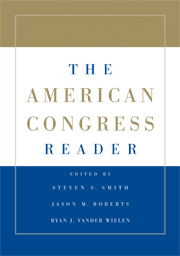Book contents
- Frontmatter
- Contents
- THE AMERICAN CONGRESS READER
- PART I THE AMERICAN CONGRESS: MODERN TRENDS
- PART II REPRESENTATION AND LAWMAKING IN CONGRESS: THE CONSTITUTIONAL AND HISTORICAL CONTEXT
- PART III CONGRESSIONAL ELECTIONS AND POLICY ALIGNMENTS
- PART IV MEMBERS, GOALS, RESOURCES, AND STRATEGIES
- PART V PARTIES AND LEADERS
- PART VI THE STANDING COMMITTEES
- PART VII THE RULES OF THE LEGISLATIVE GAME
- PART VIII THE FLOOR AND VOTING
- PART IX CONGRESS AND THE PRESIDENT
- 28 Presidential Veto Messages
- 29 Presidential Signing Statement
- 30 Veto Bargaining
- 31 The Dynamics of Legislative Gridlock, 1947–1996
- 32 The Politics of Shared Power
- 33 Conscience of a Conservative
- PART X CONGRESS AND THE COURTS
- PART XI CONGRESS, LOBBYISTS, AND INTEREST GROUPS
- PART XII CONGRESS AND BUDGET POLITICS
- PART XIII FURTHER READINGS ON CONGRESSIONAL POLITICS
- References
31 - The Dynamics of Legislative Gridlock, 1947–1996
Published online by Cambridge University Press: 05 June 2012
- Frontmatter
- Contents
- THE AMERICAN CONGRESS READER
- PART I THE AMERICAN CONGRESS: MODERN TRENDS
- PART II REPRESENTATION AND LAWMAKING IN CONGRESS: THE CONSTITUTIONAL AND HISTORICAL CONTEXT
- PART III CONGRESSIONAL ELECTIONS AND POLICY ALIGNMENTS
- PART IV MEMBERS, GOALS, RESOURCES, AND STRATEGIES
- PART V PARTIES AND LEADERS
- PART VI THE STANDING COMMITTEES
- PART VII THE RULES OF THE LEGISLATIVE GAME
- PART VIII THE FLOOR AND VOTING
- PART IX CONGRESS AND THE PRESIDENT
- 28 Presidential Veto Messages
- 29 Presidential Signing Statement
- 30 Veto Bargaining
- 31 The Dynamics of Legislative Gridlock, 1947–1996
- 32 The Politics of Shared Power
- 33 Conscience of a Conservative
- PART X CONGRESS AND THE COURTS
- PART XI CONGRESS, LOBBYISTS, AND INTEREST GROUPS
- PART XII CONGRESS AND BUDGET POLITICS
- PART XIII FURTHER READINGS ON CONGRESSIONAL POLITICS
- References
Summary
Binder explores the causes of legislative gridlock. Whereas previous scholars have concentrated primarily on divided party control between Congress and the president, Binder suggests that the distribution of policy preferences within Congress may play a more central role in causing gridlock. She finds that intrabranch party polarization and greater preference heterogeneity across the membership, as well as preference divergence between the chambers, lead to periods of decreased legislative productivity.
Although “gridlock” is said to have entered the political lexicon after the 1980 elections, stalemate is not a modern legislative invention. Indeed, in the very first Federalist, Alexander Hamilton complained about the “unequivocal experience of the inefficacy of the subsisting federal government” under the Articles of Confederation. Although stalemate may be endemic to American politics, no definitive account of its proportions or causes yet exists. In this article, I survey recent work, propose a new measure of gridlock, and test several alternative accounts of variation in gridlock over the last half-century.
There is no shortage of scholarship on the politics of gridlock. Most prominent is the work of Mayhew, who rejects the conventional wisdom that divided party control of Congress and the presidency dampens the legislative output of government. Subsequent work takes Mayhew as the point of departure, revisiting the questions he raised and researched. This project returns as well to Mayhew's work, probing in a new fashion the contours of gridlock in American national politics.
- Type
- Chapter
- Information
- The American Congress Reader , pp. 343 - 353Publisher: Cambridge University PressPrint publication year: 2008



